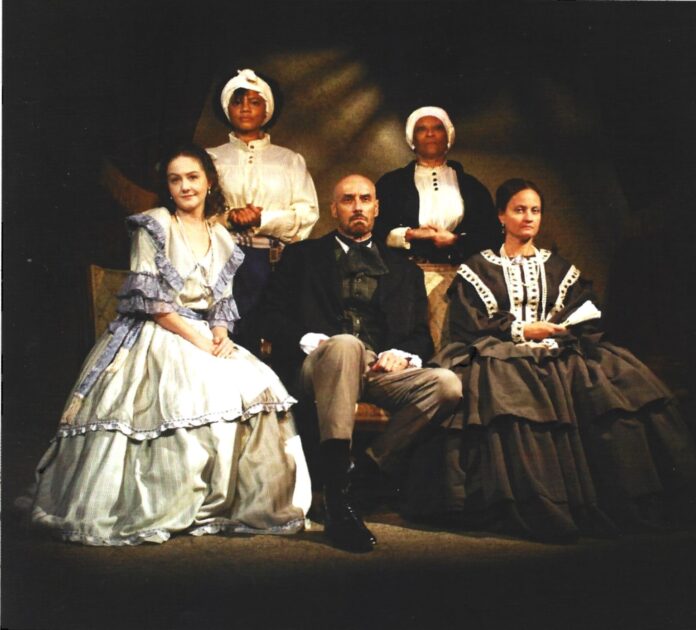Zuri asks, “What do the dead ever want?” (played by Victoria Lloyd). She is the cousin of her young mistress, Emily (Christina Cranshaw), and their skin is practically the same color, but because of her race, Zuri is enslaved while Emily is pampered and sheltered. But Zuri is older than Emily – she already menstruates – and as she loses her innocence, she learns how to rule over her own masters.
Undermain Theatre, a company located in historically black Deep Ellum, launched its 40th anniversary sea- son on Sept. 30th with “Bondage” by San Francisco playwright Star Finch, directed by Jiles R. King II. It ran until Oct. 15. Set on a Caribbean island in the nineteenth century, it is an afro-surrealist drama that exists “in the same realm as traditional fairytales which seek to alert children about the horrors that seek to swallow them.” It’s a little ironic, then, that this production is intended for mature audiences only, containing explicit content such as masturbation and lesbian sex. Though the story is frightening as an old-fashioned fairytale, this production is hindered by its staging, which limits the show’s otherwise mesmerizing magical side.
The opening scenes are almost naturalistic, and the surrealist elements don’t occur until the audience has grown used to seeing people speaking normally to each other. Part of the problem may be Robert Winn’s set, and Linda Noland’s props, which use the vocabulary of stylized realism rather than surrealism. I was soon bored during the long transitions per- formed by the actors. Each individual scene is compelling, but they are all clipped off too soon as the actors, without any trace of character, hurriedly move chairs around, underscored by afro-Caribbean music (sound design by Josh Nguyen).
The most compelling scene change was performed by Rhonda Boutte’s character Azucar, an old black woman who is also a slave. She methodically rolls a tablecloth onto a dining table, conveying the daily drudgery of slave life. Yet even if every transition had had such emotional depth, they would still slow down the show and leave the audience with too much time to think in between scenes – and the arche- typal plot doesn’t hold up to scrutiny.
Finch’s message is a warning against racial and sexual repression – warning that violence may be the only way to liberate oneself from bondage. Following the fairy tale tradition, the two villains are tropes: an alcoholic sexual predator (Master Philip, played by Jim Jorgensen) and a repressed hyper-Christian old maid (Ruby, played by Kristi Funk Dana). I am very tired of antagonistic depictions of Christianity, but even setting my prejudice aside, the staging does not provide a suitable backdrop for these characters, who are flat and banal.
The play shines when it leaps into its surrealist moments, made magical by Steve Wood’s colorful lighting design. Characters seem to be overtaken by the sound of their words flowing from the subconscious like freudian slips. Finch incorporated rhymes, assonance and startling imagery into dialogue that unleashes Zuri and Emily’s repressed anger against their masters. Their poetry is a sharp contrast with the guttural screams of their aunt Ruby, whose memory of a wasted life leaves her unable to free herself and turns her into the very thing that destroyed her. Language, it seems, allows Zuri and Emily to overcome their masters.
If words represent the combat of the mind, movement represents the fight for sexual autonomy. Certain stage pictures are memorable and frightening, such as a scene where Zuri uses Emily as a puppet, or when the two girls converse lying down on a bed with their faces hanging upside down. When the girls are alone, their bodies are free to move as whims and fancies dictate – generally in the direction of sexual experimentation. The play’s morally revolting content reveals the contradiction of an empowerment which leaves one enslaved to oneself rather than to another.
As an honest, fearless depiction of slavery and racism, “Bondage” is a timely play. A society founded on freedom needs honest examinations of what freedom means and how the dominated are propelled into domination. I am grateful to Undermain for putting on a play by a living playwright, whether or not it’s good enough to ever be considered a classic. Theater means more to me than perfection does because it is an outlet for grappling with one’s soul. This is a play about the dead – what they want most is a witness, which they receive in the living writer, artists, actors and audience who participated in this play.
